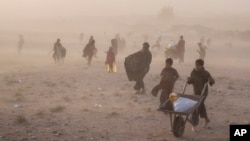Afghanistan's Taliban have blocked earthquake-related relief assistance from Pakistan over a controversial social media post by the country's prime minister amid an already strained bilateral relationship, VOA learned Thursday from highly placed official sources.
A senior Taliban official, speaking on condition of anonymity while not being authorized to discuss the matter publicly, confirmed that Pakistani Prime Minister Anwaar-ul-Haq Kakar's post on X (formerly Twitter) was behind their refusal to accept the aid.
The controversy started after a strong 6.3-magnitude quake struck parts of the western Afghan province of Herat. Islamabad immediately announced it would urgently dispatch a transport plane loaded with 5,000 winterized tents, 15,000 blankets, food items, medical supplies and a team of medical doctors for victims of the deadly calamity.
The National Disaster Management Authority prepared the consignment, sharing details on its official website. Hours later, Kakar claimed in a post on X that the aid was being dispatched at the request of the Taliban government, even though Kabul has to date formally not asked foreign countries to send relief.
Kakar also posted inaccurate details of the items his government had planned to send to Afghanistan.
"I have instructed @NDMAPk to send maximum support to the affected," the prime minister wrote, adding, "Afghanistan government has specifically asked for sending medical team, field hospital, 50 tents and 500 blankets. ... all the requested items are being dispatched in the afternoon today, with more relief goods to follow," Kakar added.
But the Pakistani plane has since not taken off, and neither side has officially cited reasons for the delay.
"Although no such request was made and our government was ridiculed for it," the Taliban official said in written comments shared via a Whatsapp messaging platform when asked about their refusal to accept Pakistani aid. He criticized Kakar's statement as "irresponsible" and advised the Pakistani leader to be extremely careful while issuing statements about Afghanistan.
A top Pakistani official privy to the matter questioned the Taliban assertions when asked to explain why Islamabad could not send the relief goods to Afghanistan.
"Kabul neither says yes nor a no; they have made a formal request for assistance and told us that they will let us know when to send," the official said. He spoke on condition of anonymity because he was not allowed to interact with the media publicly.
Earlier on Thursday, the Pakistani Foreign Ministry spokesperson, at her weekly news conference, avoided directly commenting on the controversy when asked for progress on sending Afghan relief aid.
"Pakistan expresses deep sympathy with its Afghan brothers and sisters, as they face a very difficult situation following the earthquake that took place a few days ago," Mumtaz Zahra Baloch said.
"Pakistan also stands in solidarity with its Afghan brothers and sisters and remains in contact with the interim Afghan government to meet any needs they may have during the relief and recovery efforts," she added.
Relations between the two neighboring countries have been strained over allegations that militants sheltering on Afghan soil are responsible for a dramatic uptick in deadly attacks in Pakistan since the Taliban seized power two years ago, charges Kabul rejects.
Tensions increased after the Pakistani government gave all foreigners, including an estimated 1.7 million Afghans, a one-month deadline to leave or face deportation after November 1.
Taliban leaders have severely criticized the decision and repeatedly urged Pakistan to review it, warning it could "seriously hurt" bilateral ties.
However, spokesperson Baloch reiterated Thursday that Islamabad was determined to enforce the policy to make sure individuals overstaying their visas or possessing no documentation leave Pakistan. She said the deportation would be completed orderly and in line with local immigration laws.
"This requirement pertains to all nationalities and is not specific to any nationality. … There are different prescriptions within these laws, including deportation. This process will be completed in a phased and orderly manner."
Pakistan has repeatedly clarified that the November 1 deadline is not meant for 1.4 million officially designated Afghan refugees and more than 800,000 Afghan citizenship card holders living lawfully in the country.





